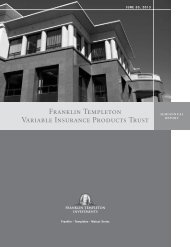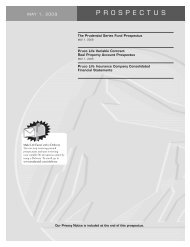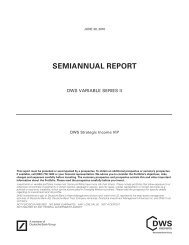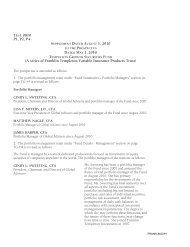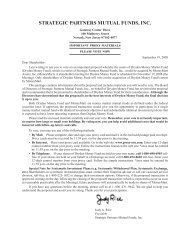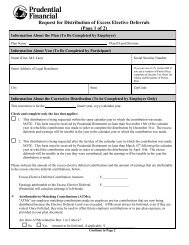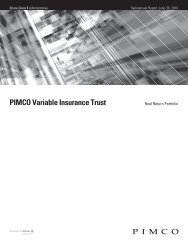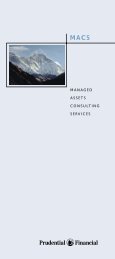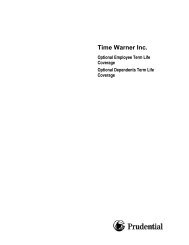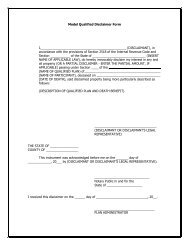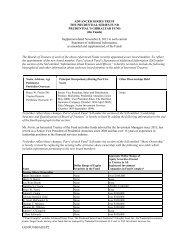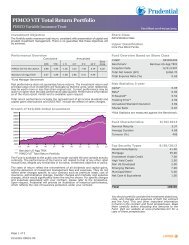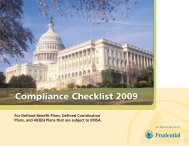Advanced Series Trust AST Academic Strategies Asset ... - Prudential
Advanced Series Trust AST Academic Strategies Asset ... - Prudential
Advanced Series Trust AST Academic Strategies Asset ... - Prudential
You also want an ePaper? Increase the reach of your titles
YUMPU automatically turns print PDFs into web optimized ePapers that Google loves.
In addition to options and financial futures, the Portfolio may invest in a broad array of other “derivative” instruments in an effort to<br />
manage investment risk, to increase or decrease exposure to an asset class or benchmark (as a hedge or to enhance return), or to<br />
create an investment position indirectly. The types of derivatives and techniques used by the Portfolio may change over time as new<br />
derivatives and strategies are developed or as regulatory changes occur.<br />
<strong>AST</strong> Parametric Emerging Markets Equity Portfolio<br />
Investment Objective: Long-term capital appreciation.<br />
The Portfolio’s investment objective is not a fundamental investment policy and, therefore, may be changed by the Board without<br />
shareholder approval.<br />
Principal Investment Policies:<br />
Under normal market conditions, the Portfolio will invest at least 80% of its net assets in equity securities of issuers: (i) located in<br />
emerging market countries or (ii) included (or considered for inclusion) as emerging market issuers in one or more broad-based<br />
market indices. This 80% policy is not a fundamental policy. The Portfolio will provide 60 day’s prior written notice to shareholders or<br />
a change in this policy.<br />
A company will be considered to be located in an emerging market country if it is domiciled in, or derives more than 50% of its<br />
revenues or profits from, emerging market countries. Emerging market countries are generally countries not considered to be<br />
developed market countries, and therefore not included in the Morgan Stanley Capital International (MSCI) World Index. Emerging<br />
market countries include countries in Asia, Latin America, the Middle East, Southern Europe, Eastern Europe, Africa and the region<br />
comprising the former Soviet Union. The Portfolio may invest without limit in foreign securities.<br />
The Portfolio seeks to employ a top-down, disciplined and structured investment process that emphasizes broad exposure and<br />
diversification among emerging market countries, economic sectors, and issuers. This investment strategy uses targeted allocation and<br />
periodic rebalancing to take advantage of certain quantitative and behavioral characteristics of emerging markets identified by<br />
Parametric’s portfolio managers. Parametric’s portfolio managers select and allocate across countries based on factors such as size,<br />
liquidity, level of economic development, local economic diversification, and perceived risk and potential for growth. The Portfolio<br />
expects to maintain a bias to broad inclusion; that is, Parametic’s portfolio managers intend to allocate portfolio holdings to more<br />
emerging market countries rather than fewer emerging market countries. Relative to capitalization-weighted country indexes,<br />
individual country allocation targets generally emphasize the less represented emerging market countries. The Portfolio’s country<br />
allocations are rebalanced to their target weights if they exceed a predetermined over-weight. This has the effect of reducing exposure<br />
to countries with strong relative performance and increasing exposure to countries that have underperformed. Within each country,<br />
the Portfolio seeks to maintain exposure across key economic sectors such as industrial/technology, consumer, utilities, basic<br />
industry/resource and financial. Relative to capitalization-weighted country indexes, Parametric’s portfolio managers generally target<br />
weights to these sectors to emphasize the less represented sectors. Parametric’s portfolio managers select individual securities as<br />
representative of their respective economic sectors and generally weight them by their relative capitalization within that sector.<br />
No more than 25% of the Portfolio’s total assets may be denominated in a single foreign currency. The value of foreign assets as<br />
measured in U.S. dollars may be affected favorably or unfavorably by changes in foreign currency exchange rates and exchange<br />
control regulations. At times, Parametric’s portfolio managers may (but are not obligated to) use hedging techniques (including,<br />
without limitation, forward contracts and options) to attempt to mitigate adverse effects of foreign currency fluctuations.<br />
The Portfolio may invest in securities of small and new companies. The Portfolio also may invest in privately issued securities,<br />
including, without limitation, privately issued securities whose investment results are designed to correspond generally to the<br />
performance of a specified stock index or “basket” of securities, or sometimes a single stock (referred to as “equity-linked securities”).<br />
The Portfolio may invest up to 15% of its net assets in privately issued securities.<br />
The Portfolio also may invest in convertible instruments that generally will not be rated, but will typically be equivalent in credit<br />
quality to securities rated below investment grade (i.e., credit quality equivalent to lower than Baa by Moody’s and lower than BBB<br />
by S&P. Convertible debt securities that are not investment grade are commonly called “junk bonds.” The Portfolio may invest up to<br />
20% of its assets in these instruments.<br />
As an alternative to holding foreign-traded securities, the Portfolio may invest in dollar-denominated securities of foreign companies<br />
that trade on U.S. exchanges or in the U.S. over-the-counter market (including, without limitation, all types of depositary receipts that<br />
evidence ownership in underlying foreign securities). The Portfolio’s investment in a depositary receipt will satisfy the abovereferenced<br />
80% investment policy if the issuer of the depositary receipt is: (i) domiciled in, or derives more than 50% of its revenues<br />
254



